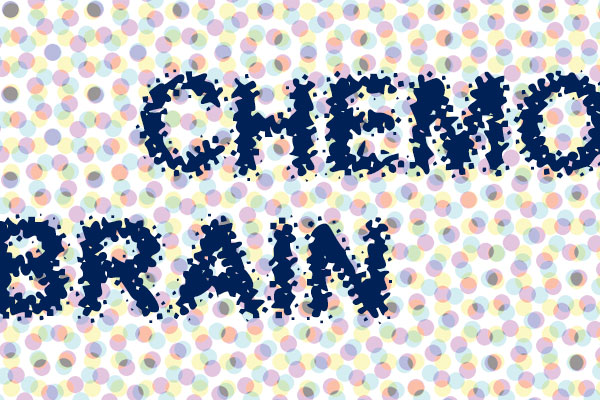Chemo Brain
What You Need to Know Right Now
by Gabriela Höhn, PhD
Sound familiar?
I’m just not myself since I started treatment. I’m fuzzy, not as sharp, and everything seems to take me longer. I forget where I put things, and can’t remember people’s names or conversations I just had with them. I’m usually really organized, and now I can’t find where I put my papers or remember whether I paid all my bills. And I’m so distractible. I can’t seem to focus on any one thing for more than a few minutes. And forget multitasking. I’m lucky if I can just get one thing done without stopping midway and then forgetting where I am. I try to hide it, but family and friends are starting to notice – even my coworkers. Am I losing my mind?
No, but you may be experiencing chemo brain. Here’s what you need to know if you find that your cognitive functioning just isn’t the same since you started treatment.
What is chemo brain?
Chemo brain is a side effect of cancer and cancer treatment that many survivors experience to varying degrees. Typical symptoms are short-term memory problems, difficulties with attention and concentration, slowed mental processing, and difficulties with multitasking.
Around 60 to 80 percent of people experience cognitive problems during and just after active cancer treatment.
• Keep it simple.
Get organized, in whatever way works for you. Put your medical bills in a shoebox if filing is too difficult. Toss your keys in a bowl by the front door when you come home. Let others host the big holiday celebrations or manage new projects at work for now. Let go of perfection; “good enough” is just fine most of the time, and especially right now.
• Write it down.
Make lists for things you need to do, and check them off when done. Don’t rely on your usually excellent memory for grocery trips, work tasks, or medication schedules. Ask others to write down directions or appointments, or to send you information by email or text so you’ll have a record of it to look back on. Keep a notebook handy, or use your smartphone, to keep track of appointments and to-do lists.
• Do one thing at a time.
Don’t try to multitask. Stay focused on the task in front of you and ask others not to interrupt. Don’t overschedule or try to do too much. Give yourself lots of extra time between appointments to avoid stress and fatigue.
• Check again.
Assume that you will make some mistakes throughout the day. Double-check appointment dates and times in your calendar. Make sure the stove really is off. Before exiting, see if you left your purse, your cell phone, or the book you’re reading on the bus or in the doctor’s office.
• Ask for help.
Let family, friends, or supportive coworkers know that you’re having some problems. Loved ones often want to help, so let them.
What do doctors call chemo brain?
Chemo brain is an informal name, of course. Cancer-associated cognitive disorder is the technical term.
What causes chemo brain?
Despite earlier assumptions about chemotherapy being the main culprit, new research suggests multiple causes. There likely is a complex interaction among the cancer itself, cancer treatments (chemotherapy, radiation, anesthesia, and endocrine therapy, for example), and the body’s biological stress response.
How long does chemo brain last?
Around 60 to 80 percent of people experience cognitive problems during and just after active cancer treatment. Most see their symptoms improve within the first year or two after treatment. However, 20 to 30 percent of survivors still experience cognitive problems several years after treatment ends, and some long-term studies show problems up to 20 years later.
Is chemo brain preventable?
We don’t know. Some treatments may have less impact on cognitive functioning, so there may be some flexibility in terms of choosing treatment options, but for now, there’s no firm answer.
Is chemo brain curable?
Again, it’s too early to say for sure. The research is still very new, and we’re only just beginning to understand the mechanisms involved. However, we can effectively treat other conditions related to treatment for cancer. For example, depression and anxiety can contribute to memory problems, so antidepressants, anti-anxiety medications, and supportive psychotherapy can be very helpful for some people. Furthermore, chronic pain and sleep problems can also impair cognitive functioning, and effective treatment options are available for these as well.
Will I ever get back to normal?
In the cancer community, we talk a lot about “the new normal.” Some cancer survivors do return to how they were before diagnosis and treatment. Many, however, may have to adapt to ongoing challenges. Learning good ways to cope effectively with cognitive changes may make all the difference in your quality of life.
Why should I know about chemo brain if we don’t have all the answers yet?
I like to think knowledge is power. Having information about possible effects of treatment on thinking, memory, and attention can normalize symptoms and make you feel less anxious. And knowing that others often experience cognitive changes too can help you feel less alone.
How do I get help for chemo brain?
If symptoms of chemo brain interfere with your everyday functioning during or after treatment, talk to your doctor about a referral. A neuropsychologist can conduct a specialized evaluation of your cognitive functioning and make specific recommendations to help you manage chemo brain symptoms. These may include behavioral strategies, environmental accommodations, cognitive training, EEG neurofeedback, medications such as stimulants, or referrals to a psychologist, social worker, or support group.

Dr. Gabriela Höhn, a cancer survivor, is a licensed clinical psychologist and neuropsychologist in New York, NY, with personal and professional interests in cognitive functioning and coping in cancer survivors. She developed the Chemobrain Workshop series at New York’s Mount Sinai Beth Israel Medical Center. To learn more about Dr. Höhn or to request a specialized Chemo Brain Checklist, visit GabrielaHohn.com.
This article was published in Coping® with Cancer magazine, September/October 2016.


